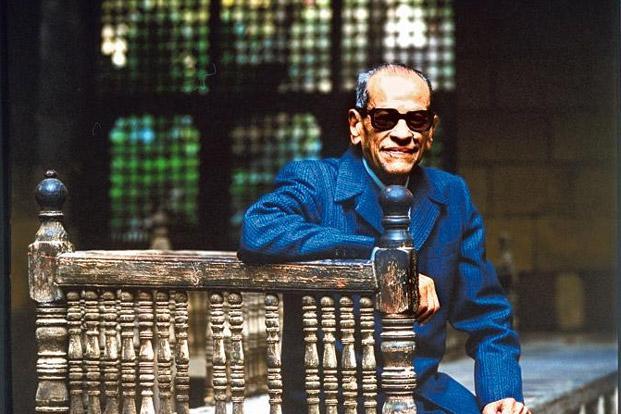Naguib Mahfouz was born in 1911 and died in 2006. He was an Egyptian novelist and winner of the 1988 Nobel Prize for Literature. He is considered as the father of modern Arabic literature and is popular throughout the Arab world. Many of his books were about Egyptian nationalism. He said politics “is the very axis of our thinking”.
納吉布·馬哈富茲出生于1911年,并于2006年逝世。馬哈富茲是埃及小說家,1988年諾貝爾文學獎獲得主。他是現代阿拉伯文學之父,并在阿拉伯世界赫赫有名。他的許多著作均與埃及民族主義有關。并認為政治是他的思想“軸心”。
Mahfouz came from a lower middle-class Muslim family in Cairo, the youngest of seven children. He had a very strict Islamic upbringing. He later wondered how “an artist would emerge from that family". Mahfouz was an avid reader and spent his early years with his head buried in books. His interests included traditional Arab literature and Western classics and detective stories.
馬哈富茲出生于開羅的下層中產階級家庭,在所有7名兄弟姐妹中排名最末。并受到了嚴格的伊斯蘭教育。他曾對誕生在這種家庭的藝術家而感到困惑。馬哈富茲喜歡閱讀,并很早就與書籍結緣。他的涉獵范圍包括傳統阿拉伯文學、西方經典以及偵探小說。

He graduated in philosophy from the University of Cairo and decided to be a professional writer. He got a job in the Ministry of Culture, where he stayed until 1972, as a movie censor. While working as a civil servant, Mahfouz wrote 34 novels, 350 short stories, dozens of movie scripts and five plays. Many of his works were made into Arabic-language movies.
他畢業于開羅大學哲學系,并決定成為職業作家。他曾在文化部擔任電影審查官,并于1972年離任。擔任國家公務員期間,馬哈富茲創作了34部小說,350個短片故事,數十部電影劇本以及五部話劇。許多作品也拍攝成了阿拉伯語電影。
Mahfouz was not a stranger to controversy. Many Arab countries banned his books because of his support of Egypt’s peace treaty with Israel. He also supported Salman Rushdie after Iran’s Ayatollah Khomeini condemned the author to death. Mahfouz received many death threats, and he survived an assassination attempt in 1994. He is the only Arabic-language writer to win the Nobel Prize for Literature.
對馬哈富茲的非議不斷。因支持埃及以色列簽署“和平協議”,他的作品也因此成為了許多阿拉伯國家的禁書。因薩爾曼·魯西迪被魯霍拉·霍梅尼判處死刑,馬哈富茲還公開支持魯西迪。馬哈富茲曾受到許多死亡威脅,1994年,他在一次暗殺行動中死里逃生。他也成為了阿拉伯史上首位獲得諾貝爾文學獎的阿拉伯作家。
譯文屬可可英語原創,未經允許,不得轉載。











